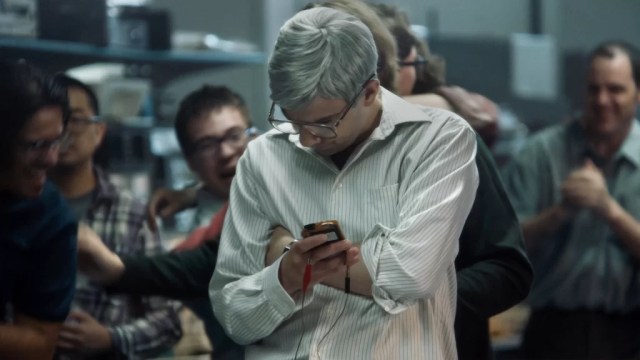
Final Rating: 4/5
Blackberry, is the latest in a steadily growing pantheon of movies you might call “product dramas”. In recent years, this emerging genre has been gracing our screens with more and more tales of the rise of classic consumer goods, and very often their fall. 2023 alone gave us the Nike basketball shoe’s Air, Cheetos’ spicy snack-fest Flamin’ Hot, and Tetris’, well… Tetris. But the year didn’t come to a close without gracing us with writer/director Matt Johnson’s film Blackberry, an engaging capitalist caper about the life and death of the world’s first smartphone.
If our cinema is a reflection of us, what should we make of this sudden surge of movies about things? What does it say about us that we seem to want to watch films about products instead of people? Are we turning to objects to avoid looking at ourselves, or in a world inundated by relentless technology is this simply another way to do just that? Whatever’s behind this new genre, it provides some damn fun rides. The opening title sequence is a quick hit whirlwind through the legacy of gadgets in our media, from Star Trek to Bladerunner, and sets the tone efficiently.
Jay Baruchel stars as Mike Lazaridis, the brains behind the tech that makes it possible. Co-starring as the ruthless businessman half of the equation is Glenn Howerton in his first serious dramatic film role. Viewers will know him from his role as Dennis on the long running TV series It’s Always Sunny in Philadelphia. A comedic role which prepared him surprisingly well for brutal entrepreneur Jim Balsillie.

Balsillie is a pure snake, cold and calculating. He manages a smile or a chuckle when it’s expedient to his goals, immediately dropping the veneer of humanity as soon as the encounter is over. Howerton turns this on and off at will, flipping demeanors on a dime. His ability to instantly drop down from congeniality to a deadpan stare translates well from TV to this role.
Also along for the ride is Matt Johnson himself as Mike’s sidekick and co-founder Doug. Johnson is an absolute delight, keeping the comic relief coming and stealing many scenes he’s in. You can also tell what a cinephile Johnson must be, because he writes Doug as a movie buff who can’t help but spout film references, quotes, and trivia every chance he gets.
His shaggy hair and anti-establishment attitude is reminiscent of a young Jack Black in High Fidelity, only swapping vinyl for computer chips. One can imagine him fitting right in at the convenience store in Clerks (or the real life video store of Tarantino’s youth for that matter). His pop culture sprinklings and unfailingly casual manner keep things from going flat, and the juxtaposition of his stoner essence against the high stakes world of Big Tech makes an effectively funny contrast.

Johnson also chooses to shoot this handheld. It’s not immediately clear if this stylistic choice adds or detracts from the movie, but it does give that “in-the-room” feel for the more tense scenes (there’s a few). Most of those scenes are led by Howerton, screaming his way throughout.
Matt Johnson does a good job of painting a portrait of a brash bullish man bent on destroying his competition. And that management style is nicely mirrored in Balsillie’s love for hockey; he’s loud, fast, aggressive. But the performance does come off slightly one-note. It’s likely more script than actor, as Johnson draws him pretty heavy-handed. The only moment showing anything other than a cold killer is one line during a fast-sinking business pitch to Verizon. Left scrambling without the Blackberry prototype or Mike to explain it, he mutters “I’m alone”, and he’s not just talking about the pitch.
Baruchel’s Mike gets more color, as his journey takes him from nerdy naivete to more practical and aggressive, more insistent and impulsive – more like Balsillie. And that’s what makes this film more interesting than some other entries in the genre. Compared to another true story of a tech giant, this is almost the inverse of 2010’s The Social Network. Perhaps the product drama can ultimately be traced back to David Fincher’s Facebook tale.

The real tragedy of the film isn’t the implosion of BlackBerry, or the expulsion of Balsillie. Rather it’s Mike’s failure to make a difference. Unable to focus until he rips apart an intercom and fixes loose wiring until an annoying static hiss is silenced, he tells Balsillie that shitty dispassionate engineering causes the world to deal with cheap results.
Mike explains his dream is to create something that isn’t just “adding to the hiss”. When Balsillie pushes back, he challenges that “good enough” is the enemy of humanity. As the house of cards starts to topple, corners are increasingly cut until “good enough” starts creeping in. It’s said by an engineer forced to rush the implementation of a half-baked trackpad, and then later by a Verizon executive presented with it. At the end of the movie, inspecting a shipment of new BlackBerry’s he despairingly outsourced to China, he hears that hiss, haunting him like Poe’s nevermore raven. Or Mozart’s laugh mocking Salieri in Amadeus. He sold his soul, and all we got was more hiss.
BlackBerry is nominated for 15 Canadian Screen Awards. Stay tuned for more CSA coverage.



